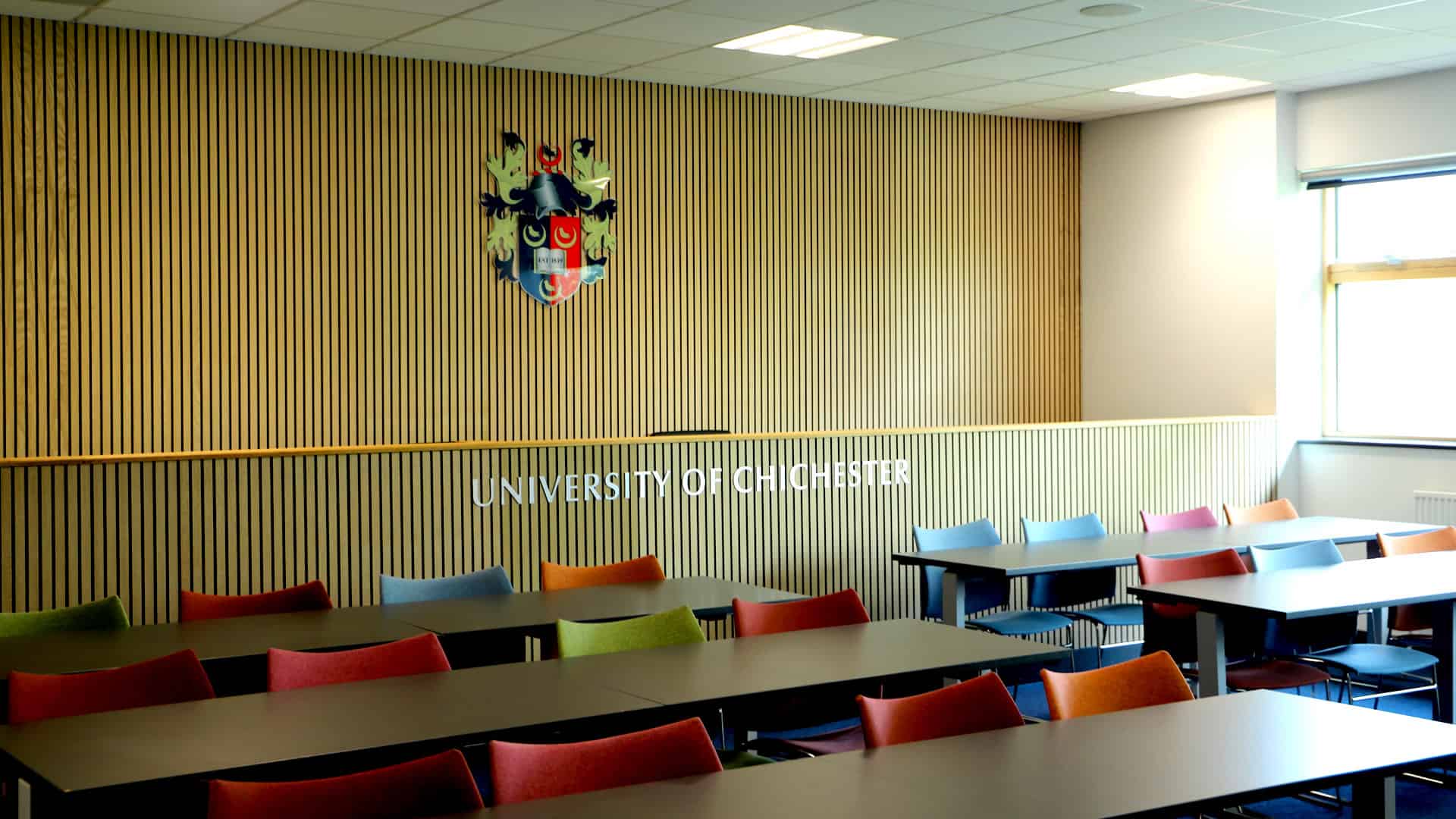1st
in the UK for overall
positivity
National Student Survey 2023 and 2024
1st
in the UK for 'teaching on my course'
National Student Survey 2023 and 2024
1st
in the UK for student satisfaction in Law
Complete University Guide 2026
Join us at one of our Open Days!
Saturday 11 October
Sunday 26 October
Saturday 22 November
Saturday 11 October
Sunday 26 October
Saturday 22 November
Our next Open Day is in:
Overview
Learn a wide range of fundamental legal principles after an introductory foundation year
Law exists to regulate pretty much everything we do, which is why it remains such a relevant and fascinating subject to study.
Our LLB (Hons) Law with Integrated Foundation Year course provides you with an introductory foundation year that provides you with the academic knowledge and confidence to progress onto a full Law degree.
Build your academic skills on an initial foundation year
This four-year course includes an integrated, introductory foundation year that develops your academic skills and confidence, and provides you with an overview of core aspects of law that you will build upon in your further years of study.
All our Law courses are suitable for those who have previously studied the subject, but previous study is not required.
Study criminal law in each year of your degree
The course provides debate, discussion and learning on the seven core areas of knowledge, as you develop your academic and practical skills to prepare for a career within the profession.
We also offer you the unique opportunity to study criminal law in each year of your degree.
Innovative assessments
We use a variety of assessment methods beyond just traditional exams in order to fully prepare you for your professional career, including mock trials and client interviews.
Feel the support of our expert teaching staff
Our intimate class sizes allow our team of experienced law experts to really get to know you and your needs, so they know how best to support you throughout your degree.
Expand your experience and professional opportunities
There are many extra-curricular opportunities you can be involved in that could include: pro bono work, mediation, work experience in a law firm or mini pupillage, in addition to participating in mooting competitions, client interviewing competitions or contributing to the University of Chichester Student Law Review.
Support for SQE 1
We also offer specific support to help prepare you for the first Solicitors’ Qualifying Examination on completion of your degree.
The Course
Gain an in-depth understanding of the foundations of legal knowledge
Integrated Foundation Year
The initial foundation year develops the academic skills you will need to excel at degree level, and provides you with a broad overview of the English legal system, global law, public law and the law of obligations.
Fundamentals of Law
Our LLB (Hons) Law with Integrated Foundation Year degree develops your knowledge and understanding of real-world legal skills in preparation for your progression into the profession.
You will study many aspects of the law, including the foundation of legal knowledge subjects of:
- Criminal law
- Contract law
- Tort law
- EU law
- Public law
- Land law
- Equity and trusts.
Explore our optional modules
You will also have opportunities to study:
- Family law
- International human rights law
- Company law
- International environmental law
- The relationship between law and society
- The impacts of morals and policy on the development of criminal law.
Modules
Select a year
Skills and Scholarship
This module provides you with opportunity to develop your academic and employability skills needed to study and work within law. You will develop your awareness of how cases and legislation are used to enhance your academic writing. You will learn how to successfully develop legal arguments both orally and in writing.
Law of Obligations
This module will give you an insight into the law of obligations by examining the foundation elements of liability within contract law and tort law. You will examine the legal requirements for the formation of a contract and factors that could see a contract void. You will also explore the liability within negligence in tort law.
Aspects of Public Law
This module gives you an insight into aspects of public law, including the role of the rule of law and parliamentary supremacy. You will also examine liability within criminal law by looking at how to establish whether a crime has been committed. Furthermore, you will explore the incorporation of human rights within the English legal system.
Law in a Global Context
In this module, you will examine the position and role of law within our modern, globalised world. You will demonstrate a critical understanding and awareness of the changing landscape of law, both now and in the future.
Introduction to the English Legal System
This module introduces you to the different aspects of the English legal system. You will examine the different ways laws are made and interpreted in court, and form an understanding of the different personnel and courts within the English legal system, looking at how effectively these operate. This module will also include an introduction to legal research and methods.
Contract Law
This module will introduce you to the different aspects of contract law. You will study the nature of contract law and the fundamental elements of a valid legal contract.
You will also develop an understanding of contractual terms, vitiating factors, termination of a contract, as well as remedies in the event of a breach.
You will continue to develop legal reasoning, research and referencing skills.
Criminal Law
This module introduces you to the different aspects of criminal law, which examines the theory underpinning criminal law and the elements of criminal liability, as well as providing an understanding of a range of criminal offences and the ability to analyse and evaluate related case law.
You will also continue to develop legal reasoning, research and referencing skills.
Constitutional Law
This module examines the different aspects of constitutional law, which involves the nature and the structure of the UK Constitution, as well as the impact of membership of the European Union and the Human Rights Act 1998. You will also continue to develop legal reasoning, research and referencing skills.
Tort Law
This module introduces you to the concept of tort law and a range of torts, including negligence, Occupiers’ liability, Product liability and Nuisance. You will develop legal reasoning, research and referencing skills.
Professional Legal Practice
The aim of this module is for you to develop an understanding of the legal services sector, legal professionalism, legal practice and the concept of law as a business.
The module will also develop your employability skills and reflective practice.
Administrative Law
In this module, you will continue to study public law by focusing on administrative law. You will examine the development of administrative law in England, judicial review and police powers.
International Environmental Law
This module introduces you to different aspects of environmental law in the context of national, European union and international law. You will examine the underpinning foundations of environmental law and how national law has developed in both criminal and civil law. You will assess the impact that the European Union and international law has had on the development of environmental law regionally and globally.
International Human Rights Law
This module examines different sources of human rights law, its impact on the English legal system and considers different substantive areas of the law under the European Convention on Human Rights including absolute, limited and qualified rights.
Professional Skills And Client Care
This module develops an understanding of the central professional skills required to work in the legal profession. You will develop key vocational and employability skills in simulated employment situations.
Re-Litigating the Past: State, Media and Historical Injustice in Contemporary Britain
This module focuses on how public histories have been rewritten in Britain over the past three decades, through the interventions of state, media, and voluntary sector institutions.
By studying these forms of investigations, you will learn about how private traumas are integrated into or transformed public memory, the ways in which and reasons why silences are maintained or broken, and the place of ‘the past’ in judicial processes.
Tort Law I
This module introduces you to the concept of tort law and a range of torts including negligence, product liability, trespass to the person and defamation, as well as relevant defences and remedies. You will continue to develop legal reasoning, research and referencing skills.
Tort Law II
This module develops your understanding of tort law, building on the knowledge you developed in Tort I. You will study a range of torts including nuisance, trespass to land, Rylands v Fletcher, occupiers’ liability, vicarious liability and breach of statutory duty, as well as relevant defences and remedies.
Work Placement
This module allows you to undertake a work placement to apply your academic learning in a related employment setting and for you to gain experience that will be useful in pursuing your future career or profession. Emphasis will be placed upon the development of vocational and employability skills, knowledge of self-reflexive work, an ability to use subject knowledge beyond the classroom and the development of skills for lifelong learning.
Dissertation
You will produce a dissertation which, as the culmination of your undergraduate studies, will enable you to engage with, and participate in, research and scholarship appropriate to your object of study.
Equity and Trusts I
In this module, you will study how the law of equity was developed, the different types of trusts, and the requirements for a valid trust.
Equity and Trusts II
In this module you will continue your study of equity and trusts focusing on the areas of law relating to when a trust is up and running, as well as considering the nature of charitable trusts.
Family Law
This module provides a study of several key aspects of family law; the law that regulates interpersonal relationships between adults and children.
Intellectual Property Law
This module provides a study of intellectual property law. You will examine different areas of intellectual property: patents, copyright, industrial design, registered trademarks, unregistered trademarks (passing off), computer programs and databases, and confidential information. You will consider the conditions for protection, scope of protection, duration and remedies.
Land Law I
In this module you will study how property is classified, the registration of land and the doctrine of tenures and estates. Your studies will examine role and impact of statutory law, common law and equity in relation to the classification and ownership of land.
Land Law II
In this module you will continue your study of land law. You will examine the topics of easements and profits, mortgages, licenses, covenants relating to freeholds and the rules of perpetuity.
Teaching and Assessment
Feel the support of experienced and expert staff with our smaller class sizes
Smaller class sizes
You will learn in small groups to allow our experienced and expert staff to mould their teaching around you.
Teaching sessions are interactive and include case analysis, interpretation of statutes, debates and discussion on every core aspect of English law.
Meet our expert teaching team
Dr Amy Elkington
Amy achieved an LLB (Hons) in Law from Brunel University and a Postgraduate Certificate in Education from the University of Portsmouth, before achieving a PhD in Law from the University of Surrey. She has since gone on to further achieve a Postgraduate Certificate in Leadership and Management from the University of Chichester.
Luke Browning
Luke achieved LLB (Hons) in Law from Birmingham City University and a PGCE in Further Education and Training from the University of Brighton. Luke is a Fellow of the Higher Education Academy and holds a PGcert in Higher education (Teaching and Learning) From the University of Chichester.
Keith Sinclair
Keith holds a first-class BA (hons) in English & History which he achieved before being awarded MA in Law by the University of Bristol. He then was then called-to-the-bar of England and Wales at the Inner Temple and awarded LL.M from City, University of London. In addition to his role at the University of Chichester, he is also a PhD candidate at the University of Southampton.
More than just exams
We use a wide range of assessment methods rather than relying just on exams.
As such, none of the modules are 100% exams, but a blend of coursework, mock trials, presentations, academic posters, mock client interviews and negotiations.
Modules are assessed at every stage of the course, allowing you to clearly see your academic progress.
Experience
Develop strong professional links and seize vital networking opportunities
National Student Survey 2024
Overall average positivity
Student satisfaction
'Teaching on my course'
 |
Gain practical advocacy experience in our new mooting roomOur new purpose-built mooting room gives you the space to develop the skills needed to argue logically, confidently and persuasively. It is the ideal location for students to practice advocacy and is the setting for our internal and inter-university mooting competitions, where teams of students argue a client’s case before a judge. |
Visiting speakers
We regularly welcome guest speakers, and recently hosted The Right Honourable The Baroness Hale of Richmond DBE.
Close community
Our commitment to a friendly and close-knit student community contributes to a high degree of success for our graduates.
Strong professional links
In your second year, you will have the opportunity to gain vital workplace experience within a law setting.
Expert staff
You will learn from experienced and expert tutors who are here to support your development.
Learning Resource Centre
The Learning Resource Centre (LRC) contains the library, a café, IT/teaching rooms and the Support and Information Zone (SIZ).
Library
Our campus library holds more than 200,000 books and over 500,000 eBooks.
Subject specific librarians
If you have difficulty finding material for an essay, seminar or project, subject librarians will be happy to provide assistance.
Royal Literary Fellows
Gain writing support from professional writers through the Royal Literary Fund.

Elisa

Ellie

Morgan
Preparation for SQE
Dedicated support for new postgraduate examinations for solicitors
The way to qualify as a solicitor in England and Wales has changed through the introduction of a new postgraduate examination process known as the Solicitors Qualifying Examinations, known as SQE 1 and SQE 2.
You will be supported in preparing for the first of the Solicitor’s Qualifying Examinations, which you can sit after completing your degree.
This will include:
- How to make a bail application.
- The role of a duty solicitor in a police station.
- How to bring a claim in the civil courts.
- The methods of resolving a dispute without resorting to court.
Work Placements
Gain vital experience through our strong links with professional settings
During your second year, you will have the opportunity to undertake a work placement that will give you vital real-world experience of working within the law profession.
You will have the choice of taking this work placement at a local law firm (e.g. Irwin Mitchell), an in-house legal department of a large company, Citizen’s Advice or at a local authority.
These placements can lead to additional opportunities, with students having sealed coveted mini-pupillage positions in chambers to enhance their professional prospects.

Ellie
Study Abroad
Explore the opportunity to study part of your course abroad
As a student at the University of Chichester, you can explore opportunities to study abroad during your studies to enrich your educational experiences.
It’s a chance to broaden your horizons, a great opportunity to meet new people, undertake further travelling and to immerse yourself within a new culture.
You will be fully supported throughout the process to help find the right destination and institution for you and your course. We can take you through everything that you will need to consider, from visas to financial support, to ensure you get the best out of your time studying abroad.
Careers
Open up your future career options
Our LLB (Hons) Law with Integrated Foundation Year course allows you to work towards becoming a solicitor or barrister.
All solicitors must pass the Solicitor Qualifying Exam (SQE Parts 1 & 2), with the University of Chichester offering specific support for our students to take the first part after they graduate.
Other career paths include:
- Paralegal
- Legal secretaries
- In-house lawyers
- Human resources
- Local and national government
- Civil services
- Teaching.
Some Law students choose to pursue a career within teaching. At Chichester, we offer postgraduate options to allow you to qualify as teacher.
Postgraduate pathways
- PGCE Primary (5-11)
- PGCE Primary (5-11): Modern Languages
- PGCE Secondary (with subject specification).
University of Chichester alumni who have completed a full undergraduate degree at the University will receive a 15% discount on their postgraduate fees.
Course Costs
Course Fees 2025/26
UK fee - foundation year
UK fee - years 1,2 & 3
International fee
EU/EEA Fee Reduction Scholarship
EU/EEA students automatically pay the equivalent of UK fees via the EU/EEA Fee Reduction Scholarship
For further details about fees, please see our Tuition Fees page.
For further details about international scholarships, please see our Scholarships page.
To find out about any additional costs on this course, please see our Additional Costs page.
Entry Requirements
Applying through Clearing
We know that you are so much more than your grades, which is why we take your aspirations, passion and personality into account. Through Clearing, we’re taking a flexible approach. Even if your grades are a little different from those advertised, please contact us – we’ll consider every application individually.
Typical Offer (individual offers may vary)
UCAS
T Level
IELTS
Non-standard Application Entry Routes
The University has an alternative entry route for applicants who have relevant skills and experience but who do not hold the formal minimum entry qualifications required. Applicants who demonstrate the necessary skills and experience to enter a course of higher education will be asked to complete an entry task involving the completion of specially set assignments.
Contextual offers
We believe everyone deserves an equal opportunity to pursue higher education, regardless of their background.
When we receive your application we consider your personal circumstances and the factors surrounding your achievements to see if you are eligible for a contextual offer. This is an offer with a reduced entry tariff – typically the equivalent of 8 fewer UCAS points for foundation year courses.
Find out more about our contextual offers.







